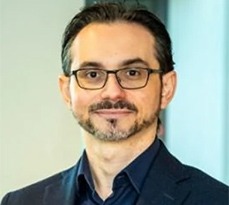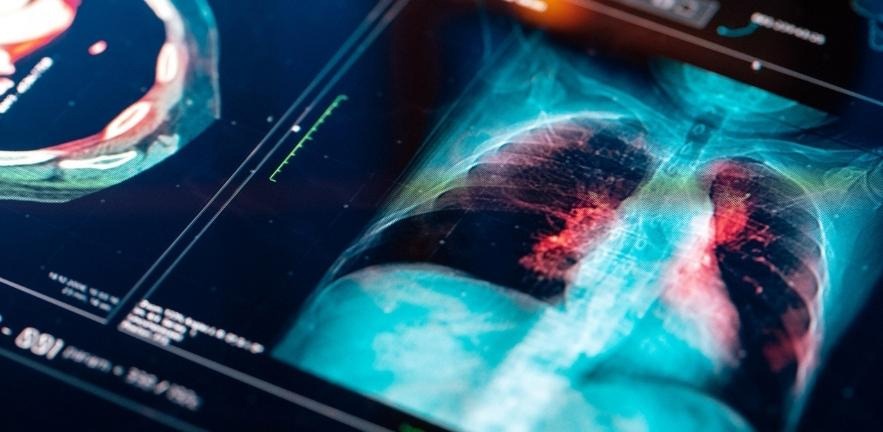
Qureight, a clinical data analytics firm supported by Cambridge Judge Business School, had its origins in a medical mystery.
“It all started three years ago”, says CEO Dr Muhunthan Thillai, a lung specialist at Royal Papworth Hospital in Cambridge. “I was asked to provide a second opinion for a patient at another hospital. They had a complicated lung disease and I went to discuss the case with my colleague (later co-founder) Dr Alessandro Ruggiero, who is a consultant Radiologist at Royal Papworth Hospital in Cambridge – we didn’t really know each other at the time.
“The patient was getting worse. In such complicated cases we usually get scans, breathing tests, blood tests, and then we put them all together. With Alessandro’s expertise in imaging and looking at the available data together, we immediately realised that the patient’s condition was deteriorating. I liaised with the team looking after them and advised we change the drug treatments. The patient fortunately improved but it made us think a lot about algorithms and the power of data, and how they should be used to better understand complex diseases in cases where experts struggle.”
Strategy forged at a 414-year-old Cambridge pub

A few weeks later, the two met for a drink at a pub, the historic Pickerel Inn (said to date to 1608) in the centre of Cambridge, and resumed their conversation – and soon decided to start what Muhunthan calls a “tech company run by doctors”.
“It became rapidly clear that our idea could help clinicians formulate more accurate timelines about patients responding to drugs, but it could also make a huge difference to big pharma companies who are developing new drugs for some complex diseases.”
Jump forward to 2022 and the firm now has ten full-time employees in addition to the two co-founders, and announced in February it had raised £1.5m in seed funding led by Playfair Capital, with participation from life sciences funds Meltwind, Ascension and Cambridge Angels.
Says Playfair Capital investor Jeevan Sunner: “The technology offers an unrivalled integrated and secure solution for managing, analysing and sharing clinical data – and is set to transform the structuring of clinical trials and eventually the treatment of patients.”
Collaborating with drug and technology companies, healthcare, and academic institutions, the start-up uses cloud-based technology to manage and curate (thus the like-sounding name “Qureight”) complex clinical data, all under the umbrella of one single platform. The firm’s technology uses digital “biomarkers” to track disease progression and drug response, with the aim of cutting the cost (and increasing the speed) of bringing new drugs to market.
Three global pharmaceuticals trust Qureight
So far, an international trio of pharmaceutical companies have partnered up with them to use the platform:
- Japan-based Takeda
- Belgium-based Galapagos
- Swiss-based Roche
“Our current targets are lung fibrosis, pulmonary hypertension and adverse drug effects in complex lung cancer patients,” says Alessandro, the firm’s Chief Scientific Officer, a cardiothoracic radiologist with a PhD in molecular imaging from Erasmus University in the Netherlands, a post-doc at Memorial Sloan-Kettering in New York and extensive experience in clinical radiology and artificial intelligence.
Accelerate Cambridge programme provided knowledge and networking
The Accelerate Cambridge programme has been a key element in Qureight’s development since the then-nascent venture joined in 2019.
“We were lucky enough to attend lectures through the Accelerate Cambridge programme from renowned academics, but another important aspect was networking,” says Muhunthan.
“Simon Thorpe, who is one of the Cambridge Angels who invests in tech and health firms, came to one of our talks and decided to invest in our venture at an early stage. Through the Business School, we met people we would have never met in our professional; lives as doctors.” Simon is also a Fellow of Cambridge Judge’s Entrepreneurship Centre.
How Qureight became world-leading during COVID-19
COVID-19 affected Qureight in 2 opposite ways, says Muhunthan, who was born in Sri Lanka and moved with his family to the UK at age 2, going on to earn a PhD in immunology and proteomics from Imperial College London in addition to his medical training and appointment as a hospital consultant.
“When the pandemic hit, we had just started the company but we were drawn back to the hospitals in a big way and, due to that, we missed some commercial opportunities. On the other hand, having a platform specialised in lung diseases accelerated our work and we became the first company in the world to show that fully automated airway analysis can be used to track such diseases (through a study published at the European Respiratory Society).
“The most difficult challenge during the pandemic was to manage our time between Qureight and being doctors. Seeing patients meant everything else had to be done in our spare time, and it wasn’t easy. We are lucky to have worked with amazing colleagues in the NHS who all helped work together through what was hopefully the worst of the pandemic.”
Qureight are unique: a tech company run by doctors
Muhunthan believes that teamwork is what makes Qureight stand out:
“Our diverse team is made of people coming from varied backgrounds and experiences and this is definitely one of our strengths. When we started raising funds, a few months ago, some investors were sceptical about Qureight being a technology company led by doctors. However, I believe that understanding very complicated diseases, pharma and clinical trials, and still regularly seeing patients, is what gives us a broader vision.
“Bringing in technical experts like Darren Gallagher, our Chief Technical Officer who worked for Hewlett-Packard Enterprise for over 20 years, has also made an incredible difference. Darren was able to tell investors exactly what was going on. They drilled him with lots of technical questions and we trusted him to provide all the right answers. Investors liked that very much.
“I think that our medical training also helped, as doctors are used to trusting each other all the time.”
What does the platform offer and what is next for Qureight?
But when it came to investors, Muhunthan says that the platform played the biggest role:
“Many companies are trying to build algorithms, but algorithms are just one part of our platform. We use very complex data to build a pipeline and give it structure. It’s not just about cool algorithms. We can aggregate multiple data sources together from a clinical trial and tell a pharma company exactly what’s happening with a drug they are testing.”
With Qureight expanding, Muhunthan knows that some fine tuning is now required, a common situation for growing companies.
“Having identified our priorities, we now need to start working on our long-term strategy. We collect data, build models that we know are extremely valuable for our clients, but how does all this translate into scalability for growth?
“The plan is to focus on our platform and provide the best possible service, but as Qureight grows bigger, organisational dynamics as well as individual responsibilities will have to be redefined. This is an expected challenge for a company of our size but it means that it is also a really exciting time for us.”
What is Venturing Forth?
This article is part of our Venturing Forth series, covering the aspirations and challenges of entrepreneurs, startups and ventures that participated in the Accelerate Cambridge programme at Cambridge Judge Business School.
Accelerate Cambridge is the Business School’s startup accelerator, which offers three-month programmes, combining entrepreneurship training, regular coaching and mentoring, as well as access to shared workspace.


